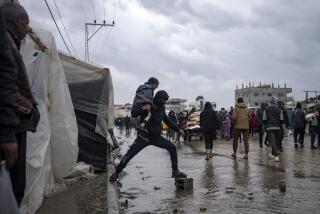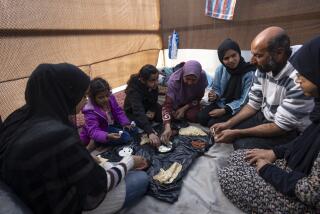BALKANS : Winter May Be Next Killer of Bosnia Refugees : Cold, hunger and disease could take a toll. Most vulnerable are thousands of unregistered Muslims in scanty shelter in Croatia.
- Share via
RESNIK, Croatia — When Djehva Ramulic and two grandchildren escaped from the horrors of “ethnic cleansing” in Bosnia-Herzegovina last month, they officially ceased to exist. Like 3,000 other Muslims now hiding between a highway and a rubbish dump, the family has been grudgingly granted refuge on condition they place no strain on Croatia’s stretched resources.
Although many are sick from months in detention camps and shattered by the execution of their husbands and sons, they have no access to medical care or any right to social assistance. Their homes have been confiscated or burned down by marauding Serbs, yet they lack the refugee status that would allow them slim hopes of resettling abroad.
“It’s as though we didn’t exist,” wailed Ramulic, 55, cradling an infant grandson in a drafty storage shed housing 14 people. “We came here barefoot, almost naked, without money. But we cannot get on the lists to go elsewhere and we won’t be able to survive here once it gets cold.”
Humanitarian relief workers struggling to deal with the largest tide of human misery to engulf Europe since World War II warn that winter could kill more of the 2 million desperate Balkan refugees than has the savage ground war that has taken at least 20,000 lives in little more than a year. They fear that tens of thousands, perhaps even hundreds of thousands, could die from disease, cold and hunger, largely the fault of poor response to a catastrophe that was apparent months ago.
Most vulnerable will be the unregistered hordes, like those at the Resnik shantytown, who are victims of both ethnic extremists and the cold shoulder foreign countries have turned to their plight. The Resnik refugees, allowed to slip quietly through Croatia’s ostensibly closed borders, lack even the right to add their voices to the deafening chorus of cries for help.
The United Nations estimates it will cost $1 billion over the next seven months to provide food, blankets and winterized shelter to those displaced by the fighting. Without this aid, the United Nations warns, “death and suffering will occur on a large scale.”
A U.N. airlift of supplies to besieged Sarajevo has been suspended since Sept. 3, when an Italian aid plane was shot down as it approached the Bosnian capital. Even if the flights resume as scheduled this weekend, both Sarajevo and Zagreb, from which aid flights originate, are plagued by heavy fog and closed to air traffic much of the winter. Aid is now getting through only sporadically by trucks restricted to a few back roads through guerrilla-infested mountains and across dirt tracks that will be impassable within two months.
“We have to get the roads open--not just one road between Mostar and Sarajevo, but all major roads to all the areas in need,” said John Fawcett of the International Rescue Committee. His agency is trying to bring in plastic sheeting and corrugated metal that would allow the hundreds of thousands living in bombed houses to repair their dwellings before snow and cold force them to join the chaotic exodus.
“If it doesn’t happen very soon, in the next few weeks, there will be masses of people on the move, people piling up on the borders of Croatia trying to move into Europe and lots of them dying on the way,” Fawcett warned. “Nobody has a real vision of this, because they haven’t had to deal with such a problem since World War II.”
Money has been slow in coming to Croatia, where there are more than 600,000 registered refugees and thousands more arriving daily despite Zagreb’s announcement a month ago that it would take no more in. But more worrisome than the lack of cash to buy food, medicine and construction material has been the unspoken assumption on the part of the world community that diplomacy will come to the rescue.
The opening of aid routes and resumption of work at vital enterprises like food-processing plants all hinge on an unlikely breakthrough at negotiations under way in Geneva.
Meanwhile, relief workers have focused on shoring up temporary dwellings in preparation for winter, bracing themselves for new onslaughts and hoping foreign countries will take more of the war victims in.
“Unfortunately,” said Michael Keats, spokesman for the U.N. High Commissioner for Refugees in Zagreb, “what we are mostly talking about in aid to the suffering is kerosene heaters and a lot of blankets.”
More to Read
Sign up for Essential California
The most important California stories and recommendations in your inbox every morning.
You may occasionally receive promotional content from the Los Angeles Times.














